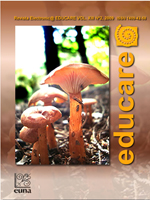La identidad nacional en tiempos de globalización
DOI:
https://doi.org/10.15359/ree.13-2.1Keywords:
identity, globalization, culture, education, multiculturalism, diversity, values, socializationAbstract
The national identity is a historical and geographical process; it is also dynamic and it is constantly transforming, in other words it is: a subject of change. It is constructed by individuals and different social groups who are born or live in a territory with a homogenizing ideological discourse and a reproducer of an imaginary national and, moreover, the cultural influence is expressed by the interrelationships among other countries, which have been accelerated by the phenomenon of globalization.
This last aspect has a profound impact not only in the economic field, but also when sharing information, ideas, values and behaviors that are assimilated by people through behaviors, symbols and meanings that are related to the imitation of foreign cultural models. But there is one point in common in the context of this essay and it is to understand that we are in an evolutionary, dynamic and complex process that is part of the socialization processes that link the daily practices of individuals, through the diversity and cultural exchange.
References
Abarca D., M. (2001). Fruto de la perseverancia. Sistema Nacional de Comisiones de Valores de
Costa Rica. San Pedro, Costa Rica: Editorial de la UCR.
Altamirano, C. (1997). Los símbolos nacionales de Costa Rica. San José, Costa Rica: Imprenta Los
Sauces.
Carazo, M. (1997). Nuestra Identidad Nacional. Revista Parlamentaria Nº 2, Volumen 5,
pp. 127-132.
Denis, L. (1995). Investigación cualitativa sobre valores en el aula. Recuperado el 22 de marzo de
, de www.tripot.com/denissantana/tesis/index.html
Galeano, E. (1989). El libro de los abrazos. Buenos Aires, Argentina: Siglo XXI.
García C., N. (1999). Globalización imaginaria. Buenos Aires, Argentina: Paidós.
Garro, L. (2002). Escudriñando la relación entre tiempo libre y medios de comunicación. Jornada de
Investigación sobre juventud. Consejo Nacional de Política Pública de la Persona Joven. San
José, Costa Rica: Ministerio de Cultura, Juventud y Deportes.
Giroux, H. (1992). Nuevas perspectivas críticas en educación. Barcelona, España: Paidós.
Hopenhayn, M. (Febrero, 2002). El reto de las identidades y la multiculturalidad. Pensar
Iberoamérica, número 0. Recuperado el 25 de mayo de 2009, de http://www.oei.es/pensariberoamerica/ric00a01.htm
Induni, G. (2002). Juventudes y construcción de identidades sociales: el papel de lo nacional. San
José, Costa Rica: Ministerio de Cultura, Juventud y Deportes.
Leandro, V. (2002). Juventudes y construcción de identidades sociales: el papel de lo nacional. San
José, Costa Rica: Ministerio de Cultura, Juventud y Deportes.
Lobo, T. (1998). Por una identidad nacional, libre y autogestionaria. Suplemento cultural Nº 51,
Programa ICAT, UNA.
Mato, D. (1994). Teoría y política de la construcción de identidades y diferencias en América Latina
y el Caribe. UNESCO, Caracas, Venezuela: Editorial Nueva Sociedad.
Meléndez, S. (2004). Aportes geográficos al imaginario costarricense en el siglo XIX. Revista
Reflexiones 83 (1), pp. 57-85.
Pérez Gómez, A. I. (1997). Socialización y educación en la época posmoderna. En Ensayos de
Pedagogía Crítica. (pp. 45-66). Madrid, España: Editorial Popular.
Rivera, E. (1997). Identidad Nacional: La globalización e identidades en América Latina. Recuperado
el 7 de abril de 2008, de /www.judithcorsino/valores-y-virtudes-parauna-peda.htm
Téllez, R.-López, G. (2002). Antropología, identidades y globalización. Elementos: Ciencia y cultura.
Revista de Ciencia y Cultura, Nº 045, Vol. 9, pp. 19-23.
Zelaya, C. (1991). Educación cívica: los valores morales, cívicos y religiosos. San José, Costa Rica:
EUNED.
Downloads
Published
How to Cite
Issue
Section
License
1. In case the submitted paper is accepted for publication, the author(s) FREELY, COSTLESS, EXCLUSIVELY AND FOR AN INDEFINITE TERM transfer copyrights and patrimonial rights to Universidad Nacional (UNA, Costa Rica). For more details check the Originality Statement and Copyright Transfer Agreement
2. REUTILIZATION RIGHTS: UNA authorizes authors to use, for any purpose (among them selfarchiving or autoarchiving) and to publish in the Internet in any electronic site, the paper´'s final version, both approved and published (post print), as long as it is done with a non commercial purpose, does not generate derivates without previous consentment and recognizes both publisher's name and authorship.
3. The submission and possible publication of the paper in the Educare Electronic Journal is ruled by the Journal’s editorial policies, the institutional rules of Universidad Nacional and the laws of the Republic of Costa Rica. Additionally, any possible difference of opinion or future dispute shall be settled in accordance with the mechanisms of Alternative Dispute Resolution and the Costa Rican Jurisdiction.
4. In all cases, it is understood that the opinions issued are those of the authors and do not necessarily reflect the position and opinion of Educare, CIDE or Universidad Nacional, Costa Rica. It is also understood that, in the exercise of academic freedom, the authors have carried out a rogorous scientific-academic process of research, reflection and argumentation thar lays within the thematic scope of interest of the Journal.
5. The papers published by Educare Electronic Journal use a Creative Commons License:















 The articles published by Educare Electronic Journal can be shared with a Creative Commons License:
The articles published by Educare Electronic Journal can be shared with a Creative Commons License: 



